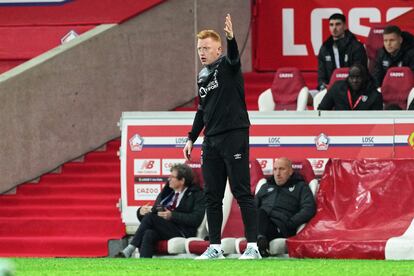From Steve Jobs to Will Still: When talent beats qualifications
A soccer coach who is thriving in France’s Ligue 1 despite not holding a UEFA Pro license, Still is following in the footsteps of a whole host of illustrious autodidacts

When it comes to doing a job you don’t have the qualifications for, it very much depends on what it is. Nobody in their right mind would trust a dentist, a lawyer or an air-traffic controller who doesn’t have some sort of certificate that confirms they know what they’re doing. But some of the best journalists, architects, filmmakers and even scientists have been daring dilettantes, astonishing autodidacts or, generally, free spirits for whom sitting at a desk for the duration of a university course was out of the question.
Gabriel García Márquez, who was a journalist in late-1940s Bogotá while studying law, defined reporting the news as “telling a tale that’s true” — a craft for which eloquence and talent are more useful than a degree. That absolutely applies to Oriana Fallaci, a luxury stowaway on the good ship journalism. And Hunter S Thompson, Tom Wolfe, Truman Capote, Rodolfo Walsh and so many other classroom deserters who were masterful tellers of the tale of truth.
What’s more surprising is that contemporary architecture has produced a veritable constellation of geniuses who shunned the tedious box-ticking exercise of making it through university: from Frank Lloyd Wright to Le Corbusier, from Carlo Scarpa to Tadao Ando and Mies van der Rohe. None of them, as far as we know, have designed a building that has fallen down because of a structural miscalculation. And what can you say about some of the great engineers, designers and inventors? Nikola Tesla, Thomas Alva Edison, Mark Zuckerberg, Bill Gates and Steve Jobs: talent in spades, and not a single higher degree between them.
The latest antidote to society’s relentless fixation with qualifications is the story of Will Still, a soccer coach who is one of the game’s men of the moment, a provincial Cinderella in the sport’s metropolitan, billionaire era. Still took charge of Stade de Reims with the team in ruins, plumbing the depths of France’s Ligue 1, and has turned Les Rouges et Blancs into a well-oiled machine, a side far greater than the sum of its parts, a tough nut to crack even for the lavish, star-studded Paris Saint-Germain of Messi, Mbappé, Neymar and company. At the end of January, Reims memorably held PSG to a draw at the Parc des Princes, the sports daily L’Équipe describing the visitors as playing with “fervent intensity” and drowning the Parisians in an ocean of “sweat and adrenaline.”
At the wheel of the ship is the singular figure of Still, a Belgian born to British parents who is only just over 30, and who has a past as an assistant in second-rate dugouts. He doesn’t yet have UEFA’s Pro license, which is required almost universally if a soccer coach wishes to take charge of a top-level professional team. As a result, for every game he oversees as Reims boss, the club is hit with a fine of €22,000. Reims’ president, Jean-Pierre Caillot, says they’re only too happy to hand it over. It’s a small price to pay to enjoy the services of a man who has given the club back its pride, who has made it competitive again, who has re-established the team’s connection with its fans and restored the side’s “true spirit.”
To top this story off, Still — a soccer obsessive who never played the game at a high level — has revealed in interviews that where he really learned his trade as a coach was on the video game Football Manager, a soccer-management sim to which he dedicated thousands of hours as an adolescent, when he shared a bedroom with his older brothers in a Walloon city on the outskirts of Brussels. At the keyboard, Still was a European champion many times over as head coach of the club he has loved throughout his life, Londoners West Ham United.
It’s only fair to acknowledge, though, that not all Still’s training as a soccer coach has been virtual. He took a university course at Preston North End, one of England’s oldest clubs, was a video analyst under Yannick Ferrera at Sint-Truidense, and then joined the coaching staff at Lierse, Standard Liège and Beerschot. Last summer, he crossed the Franco-Belgian border to work as number two to Óscar García Junyent at Reims. After the season began disastrously, with five defeats and a draw, the Catalan was fired — and Still was offered the top job in an interim capacity, during the short period that remained before club soccer stopped for the World Cup in Qatar.
He excelled. Leading a squad of players with plenty to prove, he transformed a team whose chief assets are the Moroccan international Yunis Abdelhamid; Junya Ito, a Japanese player who has never quite delivered on his early promise; and Folarin Balogun, a young fox in the box on loan in France from Arsenal. Still, a coach with talent but not the qualifications, has won the support of the fans and the confidence of the board. Van der Rohe and García Márquez would be proud. To become a saint, you don’t need to have been a priest. Sometimes it’s the stowaways who stop the ship from sinking. The finest fairy tales are usually the ones that are true.
Sign up for our weekly newsletter to get more English-language news coverage from EL PAÍS USA Edition
Tu suscripción se está usando en otro dispositivo
¿Quieres añadir otro usuario a tu suscripción?
Si continúas leyendo en este dispositivo, no se podrá leer en el otro.
FlechaTu suscripción se está usando en otro dispositivo y solo puedes acceder a EL PAÍS desde un dispositivo a la vez.
Si quieres compartir tu cuenta, cambia tu suscripción a la modalidad Premium, así podrás añadir otro usuario. Cada uno accederá con su propia cuenta de email, lo que os permitirá personalizar vuestra experiencia en EL PAÍS.
¿Tienes una suscripción de empresa? Accede aquí para contratar más cuentas.
En el caso de no saber quién está usando tu cuenta, te recomendamos cambiar tu contraseña aquí.
Si decides continuar compartiendo tu cuenta, este mensaje se mostrará en tu dispositivo y en el de la otra persona que está usando tu cuenta de forma indefinida, afectando a tu experiencia de lectura. Puedes consultar aquí los términos y condiciones de la suscripción digital.









































